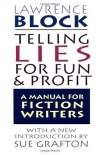Manual For Fiction Writers by Block, Lawrence (classic books to read .TXT) 📗

Book online «Manual For Fiction Writers by Block, Lawrence (classic books to read .TXT) 📗». Author Block, Lawrence
So Scudder would be an ex-cop, working as a private detective. But what would his life be like? And why would he have left the force?
Quite naturally, I borrowed elements of my own life and gave them to Scudder. I had recently separated from my wife and children and moved from rural New Jersey to midtown Manhattan. I decided that, after Scudder had left the police force, his marriage had fallen apart and he'd moved from Long Island to the city. Because I liked the neighborhood I lived in and wanted to use it as a backdrop for fiction, I placed Scudder right on my block, West 57th between Eighth and Ninth Avenues. I had an apartment, but I felt a hotel room was more Scudder's style, and I put him in one.
Why had he left the force? Because of a scandal, I thought, and then I rejected the thought. I wanted to give him a more personal kind of a scar, wanted him to bear more guilt in his own eyes than in the eyes of others. I decided he'd been drinking in a tavern while off-duty, had foiled a holdup attempt, but that one of the shots he fired had ricocheted and killed a child. While he was exonerated of any wrongdoing, he'd been unable to exonerate himself.
Where did this come from? I couldn't have told you this at the time, but it strikes me now that it constituted a pretty clear projection of self into character. I had abruptly quit a marriage of over a dozen years' standing. I believed, and professed to feel, that I had been correct in so doing. But, if I had not killed a child, I had abandoned three of them, and on some level I could not exonerate myself.
One of the quirks with which I furnished Scudder was a propensity for hanging out in churches. He didn't attend services and had no formal belief in God, but after moving to Manhattan he found himself frequently entering churches and using them as a source of peace and quiet. In this instance, I was simply supplying Scudder with a behavior pattern I had lately adopted myself. New York is noisy, and churches do provide a quiet place to sit and think. There was very likely an element of unconscious spiritual quest in my visits to churches, and no doubt this was true of Scudder as well. I did make his behavior pattern rather more rigid, though, and I had him make a thing of lighting candles for people who had died, invariably including the little girl his ricocheting bullet had killed.
In addition, I had him tithe in a compulsive fashion, giving a tenth of whatever income his detection brought him to whatever church he next visited. He did this not because he felt they would do something worthwhile with the money, or for any reason that made sense to him, but because it had come to be something he simply did. In explaining this in the character sheet I wrote about him, I noted, He does a lot of things without knowing why. While I certainly have never tithed, and seriously doubt that I ever shall, I certainly did things without knowing why. And still do.
Since Scudder was already a denizen of my neighborhood, I let him hang out at the same saloon where I spent a great deal of my own time. I was drinking pretty heavily around that time, and I made him a pretty heavy drinker, too. I drank whiskey, sometimes mixing it with coffee. So did Scudder.
He and I were different in innumerable ways. He'd been a cop for all those years, and he still looked and thought and reacted like one. His attitudes and responses were not mine. But there was enough of me in him so that I knew him, and his organic evolution made him plausible, sympathetic and original.
It was good to renew that acquaintance. It was good to spend two-hundred-plus pages in his company, good to be able to report that Matthew Scudder is alive and well and living on West 57th Street.
CHAPTER 43
Casting
THE WAITRESS watched him with wary hostility, as if she were afraid he might be putting her on. She was middle-aged and hard-faced, with a beehive of champagne-colored hair that she kept patting and touching to reassure herself it was still there in all its glory. But she was not a bit out of place in the steakhouse, with its linoleum-covered floor and tube-steel furniture and blaring, country-rock jukebox.
That's from Cutter and Bone, by Newton Thornburg. It's good writing, but then if there's a bad sentence anywhere in the novel I didn't notice it. I picked this particular passage to quote because the writer has given us such a perfect description of a bit player. That's all we're ever told about this waitress. She doesn't have a line of dialogue, never turns up in another scene. But we already know everything we have to know about her. For some readers, her moment on stage will be memorable?as it evidently was





Comments (0)